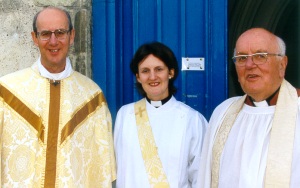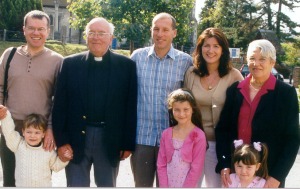 Canon David Eaton, Rev Briony Martin, Canon Sandy Morris: who's the odd one out? |
 The Morris congregation |
Canon Sandy Morris 50
years a Priest
enlarging on an article in November 2002's
Parish of Leatherhead magazine
 Canon David Eaton, Rev Briony Martin, Canon Sandy Morris: who's the odd one out? |
 The Morris congregation |
When Canon Sandy Morris was interviewed after the war about his future plans, he heard himself saying, "No, I won't need any help from you - I'm going into the church".. This he did, and was ordained on 29th Septeniber 1952. His first parish was in Sheffield, followed by several years in South India. Before becoming Vicar of Leatherhead in 1971 he was Vicar of Bexley, in Kent. Members of his final parish were delighted that he should return to Leatherhead this year to preach on the 50th anniversary of his ordination.
In his sermon he reviewed many changes in the church in the last 50 years, such as the growth in ecumenism, and the role of women, but concluded that the basic aim will always remain unchanged - to look to the furtherance of the Kingdom of God, on earth and in heaven. We wish Sandy and Arm every blessing and happiness.
From Sandy: "Ann and I would like to thank all those who very kindly sent us cards and good wishes. We particularly valued the warmth of your welcome and the very generous presents you gave us after the service."
SERMON BY CANON SANDY MORRIS ON 50TH ANNIVERSARY OF HIS PRIESTING 29TH SEPTEMBER 2002, GIVEN AT ST MARY & ST NICHOLAS LEATHERHEAD, HIS LATE PARISH.
I have a confession to make. When your Vicar very kindly invited me to preach on the 50th anniversary of my ordination as priest I realised that though I can remember every detail of the occasion fifty-one years ago when I was made deacon in Sheffield Cathedral, when it came to my ordination as priest one year later my mind is a complete blank. Now in one sense that is natural enough. The real turning point in your life is when you cease to be a layman and put on a dog collar for the first time. And yet it is your ordination as a priest that really matters. When you start out as a curate you are a deacon - a sort of probationer - whose job it is to assist the priest. You cannot celebrate the eucharist, or give the blessing or the absolution, and you wear your stole crossed over your chest. You usually do that for one year.
When you are ordained priest you remain one for life unless you are consecrated as a bishop.
And it's instructive to read what is said at
your ordination. "A priest is called by God to work with his
bishop and his fellow priests as a servant and shepherd among the
people to whom he is sent. He is to proclaim the word of the
Lord, to call his hearers to repentance and in Christ's name to
absolve and declare the forgiveness of sins. He is to baptise and
to prepare the baptised for confirmation. He is to preside at the
celebration of Holy Communion. He is to lead his people in prayer
and worship, to intercede for them, to bless them in the name of
the Lord and to teach them by word and example. He is to minister
to the sick and to prepare the dying for their death. He must set
the Good Shepherd always before him as the pattern of his
calling, caring for the people committed to his charge and
joining with them in common witness to the world." Now those
words remain constant. But the world to which they apply is
constantly changing as is the church itself. Let me take just
three examples:
* When I was first ordained, the local Roman Catholic priest
would not give me the time of day. We were not even allowed to
say the Lord's Prayer together. By the time I became Vicar here
twenty years later my first visitor was the local Roman Catholic
priest, Ted Dilger. And during my time here I was on Christian
name terms with every priest. I preached at mass at Pentecost and
I was the first Vicar since the Reformation to allow a Roman
Catholic priest into this pulpit. Oh, and by the way, fifty years
ago, because they believed in the itinerant ministry, the
Methodist Minister never stayed more than three years. Now it is
usually seven or eight.
* Secondly, when I was first ordained the laity took virtually no
part in worship. Now not only is our service enriched by the fact
that they can administer the chalice, they also read the
scriptures and conduct the intercessions. I well remember a lay
reader, as they were called at the time, who took his bat home,
because, he said, when lay people could do such things, what was
the point of his existence?
* Thirdly the position of women has altered dramatically. When I
was in my second curacy, the bishop at that time took the unusual
step of putting a woman in charge of a parish when the church
there was facing closure. But I had to celebrate the Holy
Communion for her because she was not allowed to do so. But what
really struck home was when I was later in India. There on one
occasion I celebrated in a village in my stumbling Marathi which
must have been virtually intelligible to the congregation. And
there standing beside me was a missionary who not only spoke the
language like a native but who had taught both children and
adults, prepared them for confirmation and had virtually been the
minister of the parish. But she was a woman! Now, as you know,
large numbers of women have been ordained priest and you now have
your second woman curate. Here surely is where God is speaking to
us.
When I was ordained I was one of eight priests. That number fell steadily over the years. When I was first vicar here, we had three priests. Now it is two and if it was not for women being ordained it would not even be that. So where do we stand now? The church in this country has declined in numbers (and some would say in influence) during the last fifty years. That, incidentally is not true all over the world. The day when the Archbishop of Canterbury, who heads the worldwide Anglican Communion, may well not come from these islands, is no longer very far off. So what does it mean to be a priest today? (And for convenience when I say "he" I mean either sex).
First that he is a specialist. He has been trained to understand the basics of the faith as they are revealed in the Bible. His function is to help those of you who have to live out your lives in commerce or industry, in the professions and at home, to see the relevance of those links to all that you do. He cannot do it for you. It must be a two way process of prayer and discussion.
Secondly, in a very real sense (whether he likes it or not) he represents the church to the world. He is our accredited minister of the body of Christ. This is symbolised not only by the part he plays in public worship, but also by the contacts he has with associations and individuals in society at large.
Thirdly, he must always be available to all who need his help. His function is not always very clear. Not only is the impossible often expected of him he will sometimes ask himself how he differs from a psychiatric social worker or a welfare officer from the Ministry of Social Security.
It certainly does not mean that he must always rush in with a "religious answer" to every problem. There is a time to speak and a time to keep silent, particularly when one is retired! Preaching can often involve listening, understanding and caring. [Jesus' parable of the sower underlines the need to understand the nature of the soil in which the seed is planted.] But neither must he be afraid to speak when the time is right. All of us (and that certainly includes the clergy) are often far too ready to remain for even at the point where we only discuss trivialities like the weather or what are England's chances of qualifying for the finals of the European Cup. Above all he is a member of a family, of a team, the Body of Christ. This again is particularly true of a retired priest, but if ever he sees his work in purely individualistic terms, then he is lost. It is no accident that we are sharing together in this service of Holy Communion, because we all share in a common ministry. My joys and sorrows (and this is equally true of David) are yours too as we all work together for the coming of the Kingdom of God.
from January 2004 magazine
A Message from Sandy and Ann Morris We are
very grateful for all the letters and cards expressing love and
best wishes for our Golden Wedding. We had a
marvellous week, beginning with a lunch for all the family in a
private room at a restaurant in Cambridge. We were then booked in
for three nights in the Blakeney Hotel, North Norfolk,
overlooking the quay towards the sea. It was a complete surprise
- the hotel was very good with wonderful food! We then spent two
nights with Cathy, Marcel and their three children before Cathy
brought us home on the Friday. All in all, it was a marvellous,
memorable experience; thank you all very much. Sandy and Ann
please click the Back button in your Browser toolbar to return to the page you came from